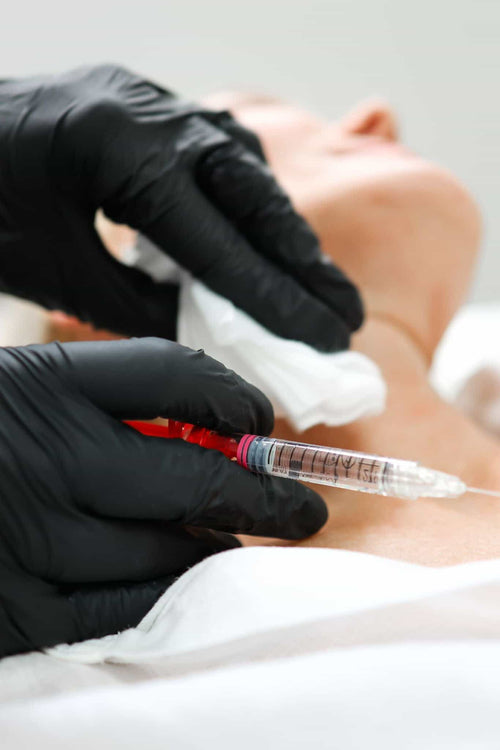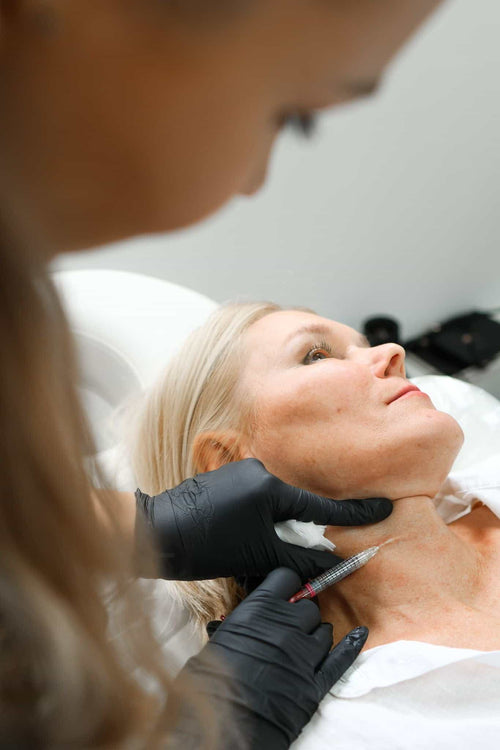Why Can’t You Have Lip Filler When Pregnant
Reserve Your Dermal Filler Consultation with Dr. Laura Geige at It’s Me and You Clinic
Hormonal Fluctuations During Pregnancy

The Impact on Dermal Fillers
Hormonal fluctuations are a hallmark of pregnancy, dramatically impacting a woman’s body both internally and externally. These changes can influence how dermal fillers perform and pose potential risks.
Here’s a breakdown of the hormonal shifts during pregnancy and their connection to dermal filler treatment:

-
Increased Estrogen and Progesterone:
These hormones surge throughout pregnancy, primarily affecting collagen production. Collagen is the protein that provides structure and elasticity to the skin.
While increased estrogen can initially stimulate collagen synthesis, prolonged exposure can lead to increased collagen breakdown, weakening the skin’s scaffolding.
-
Fluid Retention:**
Pregnancy often involves significant fluid retention. This can cause swelling and make it difficult for dermal fillers to achieve predictable results. The filler may spread unevenly or dissipate faster as excess fluid moves through the tissues.
-
Thinner Skin:**
Pregnancy hormones can thin the skin, making it more sensitive and susceptible to bruising, inflammation, and other complications associated with dermal filler injections.
These hormonal changes combined create a less-than-ideal environment for dermal fillers. The risk of:
-
Uneven distribution of filler
-
Faster breakdown and absorption of the filler
-
Increased bruising and swelling
-
Allergic reactions or inflammatory responses
Ultimately, the American Academy of Facial Plastic Surgery recommends avoiding dermal filler injections during pregnancy due to these potential complications.
Potential Complications and Risks
Pregnancy triggers significant hormonal shifts that profoundly impact a woman’s body, preparing it for the incredible journey of nurturing and growing a baby. These fluctuations influence numerous physiological processes, including skin health, blood volume, and immune function.
While these changes are essential for a healthy pregnancy, they can also increase certain risks associated with medical procedures like lip filler injections.
Hormones like estrogen and progesterone surge during pregnancy, impacting collagen production and tissue elasticity. This heightened sensitivity means the body might react unpredictably to fillers, potentially leading to uneven distribution, swelling, or migration of the injected material.
Additionally, pregnancy elevates blood volume, which can make it more challenging for the body to process injected substances safely. The increased vascularity also raises the risk of bruising and bleeding complications during and after the procedure.
The immune system undergoes significant changes during pregnancy, becoming more sensitive and prone to reacting to foreign substances like fillers. This heightened response could lead to inflammatory reactions or allergic responses to the filler material.
Moreover, certain types of fillers may contain ingredients that haven’t been thoroughly studied for their safety during pregnancy. As a precautionary measure, it’s best to avoid any potential risks to both mother and developing baby.
The unpredictable nature of these hormonal shifts, coupled with the increased risks associated with pregnancy, make lip filler injections inadvisable during this time. Consulting with a healthcare professional is crucial for obtaining personalized advice and ensuring the well-being of both mother and child.
Safety Concerns for Both Mother and Baby
Weakened Immune System
During pregnancy, a woman’s body undergoes significant hormonal and physiological changes. These changes can impact the mother’s health as well as the developing fetus.
One procedure that poses potential risks during pregnancy is lip filler injections.
Here’s why having lip filler during pregnancy is generally discouraged:
- Weakened Immune System: Pregnancy temporarily weakens the mother’s immune system, making her more susceptible to infections. Lip fillers can introduce bacteria into the body through the needle, increasing the risk of infection.
- Unknown Effects on Fetus: The long-term effects of lip fillers on a developing fetus are not well-understood. Some ingredients in lip fillers may cross the placental barrier and potentially harm the baby’s development.
- Allergic Reactions: Pregnancy can heighten sensitivity to allergens, including those found in lip filler products. An allergic reaction could be more severe during pregnancy and pose a risk to both mother and baby.
It’s essential to prioritize the health of both mother and baby during pregnancy. Consulting with a healthcare professional is crucial before undergoing any medical or cosmetic procedures.
They can provide personalized advice based on individual circumstances and risks.
Unforeseen Allergic Reactions
Pregnant women face numerous hormonal and physiological changes that can significantly impact their health and the well-being of their developing baby. Lip filler injections, while generally safe for non-pregnant individuals, present potential safety concerns during pregnancy due to these changes.
One primary concern is the unknown long-term effects of filler substances on the fetus. The ingredients in lip fillers, such as hyaluronic acid or collagen, can cross the placenta and potentially reach the developing baby. While studies on this specific aspect are limited, the potential for developmental risks cannot be ruled out.
Another worry is the risk of allergic reactions in both the mother and the baby. Pregnant women experience heightened immune sensitivity, making them more susceptible to allergies and adverse reactions to substances, including fillers.
Furthermore, any swelling or inflammation caused by lip filler injections could potentially affect blood circulation, which is already under increased demand during pregnancy. This can disrupt the delicate balance necessary for healthy fetal development.
Lastly, the act of needle insertion carries a slight risk of infection, a concern that is further heightened during pregnancy when the immune system is compromised.
It’s crucial to prioritize both maternal and fetal health during pregnancy. While lip fillers might seem like a minor cosmetic procedure, the potential risks outweigh the benefits in this vulnerable state.
Long-Term Effects Unknown
Limited Research Data
Long-term effects of certain substances and procedures, including lip fillers, are often unknown when research data is limited.
This lack of long-term research can be particularly concerning during pregnancy, a time when the body undergoes significant changes and the developing fetus is highly sensitive to external influences.
Here’s why limited research data on lip fillers and pregnancy raises concerns:
- Potential for Adverse Reactions in the Fetus:
- Limited Understanding of Long-Term Impacts:
Long-term studies on lip fillers and pregnancy are often lacking, making it difficult to assess potential consequences for both mother and child that may not appear immediately.
- Individual Variation in Response:
Consult with Dr. Laura Geige for Dermal Fillers Today
Every pregnancy is unique, and how a woman’s body reacts to substances can vary greatly. What might be safe for one pregnant person could pose a risk to another.
Ingredients in lip fillers may cross the placenta, potentially exposing the developing fetus to unknown risks.
Book a Dermal Filler Appointment with Dr. Laura Geige Today
Even if a filler is generally considered safe, its effects on a fetus are not necessarily predictable.
As a result of these uncertainties, medical professionals generally advise against using lip fillers during pregnancy as a precautionary measure.
They prioritize the health and well-being of both mother and baby.
Precautionary Measures for Future Treatments
One of the primary reasons why lip filler injections are discouraged during pregnancy is the unknown long-term effects** on both the mother and the developing fetus.
Although dermal fillers generally considered safe for adults, their impact on a pregnancy hasn’t been extensively studied.
Substances used in lip fillers can cross the placenta, potentially exposing the fetus to chemicals whose long-term consequences are unknown.
This lack of definitive research makes it prudent to err on the side of caution and avoid procedures with potential risks during this sensitive period.
While some doctors might offer limited guidance based on anecdotal evidence or studies on related substances, concrete data specific to lip fillers and pregnancy is lacking.
This underscores the importance of prioritizing the well-being of both mother and child by opting for non-invasive beauty treatments during pregnancy.
Precautionary measures** for future treatments involving pregnant individuals include:
1. **Extensive Research:** Conducting thorough research on the composition of filler substances, their potential effects on fetal development, and any existing studies on their use during pregnancy.
2. **Longitudinal Studies**: Investing in longitudinal studies that track the health of both mothers and children exposed to dermal fillers during pregnancy. These studies can provide valuable insights into long-term risks and benefits.
3. Improved Transparency:** Requiring manufacturers to clearly disclose the ingredients used in lip fillers and conduct comprehensive safety assessments specifically for pregnant individuals.
4. **Open Communication:** Encouraging open communication between healthcare providers and expectant mothers about the potential risks and benefits of cosmetic procedures during pregnancy.
Democracy Defense Coalition My Mental Health Rocks Elizabeth Rohrbaugh Market Day ME
- Why Can’t You Exercise After Lip Filler - November 3, 2025
- What Is The Best Age To Start Considering Bum Filler Injections? - November 2, 2025
- What Are CBD Infused Gummies And How Do They Work - October 30, 2025
